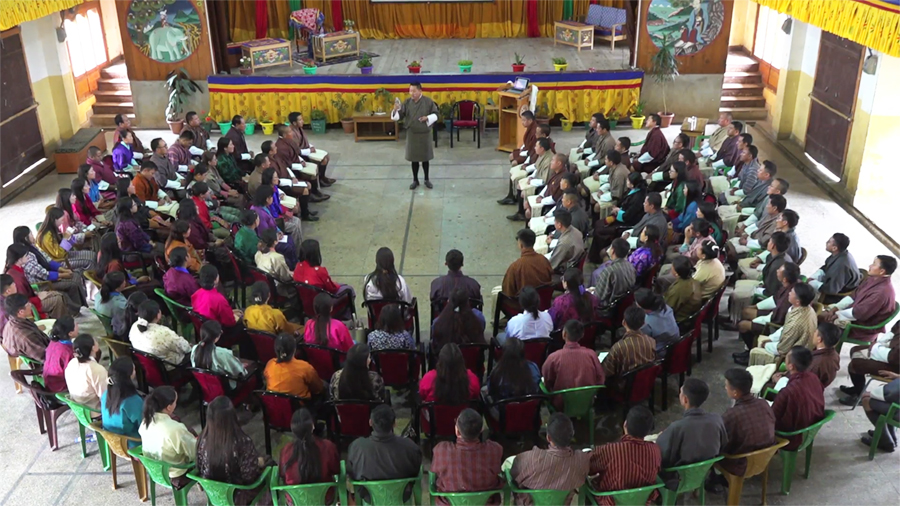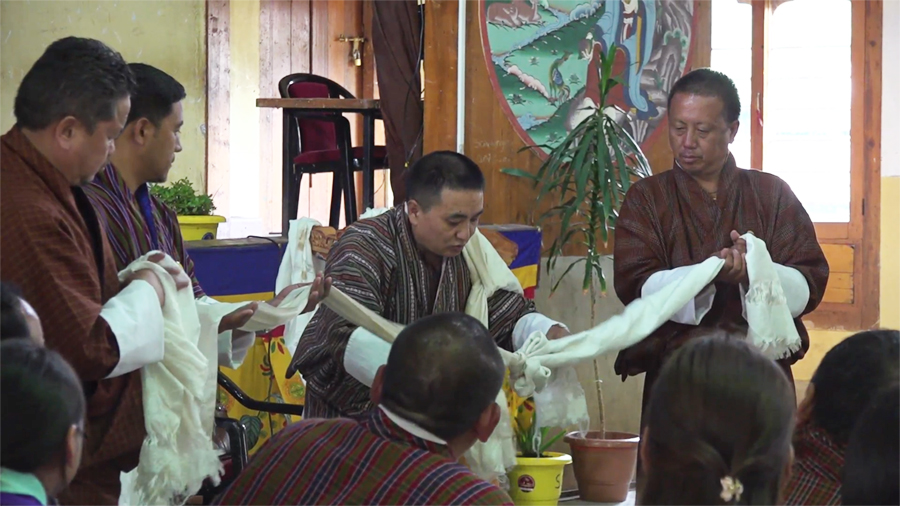
To strengthen and standardise Bhutanese social etiquettes or Driglam Namzha lessons in schools, the Department of Culture and Dzongkha Development has initiated a yearlong nationwide training for teachers, NFE facilitators and non-teaching staff. After the training, schools will implement the new Driglam Curriculum. The training programme started from Wangdue Phodrang recently where more than 600 educators were trained.
 The modules aren’t exactly new, but officials from the department emphasise that simply learning how to wear traditional attires like the Gho, Kira, Kabney, and Rachu, as well as other disciplinary activities, is not sufficient. They stress that a fundamental shift in mindset towards positive behaviour is necessary. Teachers are encouraged to instil these values and concepts in students to foster meaningful change.
The modules aren’t exactly new, but officials from the department emphasise that simply learning how to wear traditional attires like the Gho, Kira, Kabney, and Rachu, as well as other disciplinary activities, is not sufficient. They stress that a fundamental shift in mindset towards positive behaviour is necessary. Teachers are encouraged to instil these values and concepts in students to foster meaningful change.
Jigme Yoezer, Driglam Specialist, Dept. of Culture and Dzongkha Development, Home Affairs Ministry said “Children no longer use honorific terms when talking to dignitaries. They also do not get up when officials visit them. That is because the parents have failed to educate their children of such etiquette. If we look at this situation, the practice of social etiquettes has drastically declined.”
With the new initiative, all teachers are equally responsible for teaching Driglam Namzha lessons unlike in the past when Dzongkha teachers mostly took up the classes.
Tashi Tenzin, Principal of Samtengang Central School said “What we have been practising so far, we thought that Driglam Namzha at our level is just wearing Kabney and then some certain protocols. But after attending this session, it’s more than that. It is the taming of mind, body and speech so that we can cascade to our learners.”
Pemba Tshering, a teacher at Kazhi Primary School said “It is not only the education that matters. If a person needs to get a good education, his heart should be in the right place. If we cannot change the mindset of the learner, I think no matter how highly qualified a person is, it will be difficult for him or her to succeed in life.”
“We have Driglam Namzha session every Monday and during that session, all the teachers were involved and we have been teaching Driglam Namzha intensively. However, we didn’t include mindset as a part of Driglam Namzha but then after attending this two-day programme, I came to realise that mindset is also one of the important components of Driglam Namzha,” said Kinley Wangmo, Samtengang Primary School’s teacher.
Some schools in Wangdue Phodrang attended the training in the first batch and they have already started implementing the curriculum and guidelines.
Namgay Dorji, Principal of Wangdue Primary School said “Because of this guideline and curriculum, I think it is going to help us and I think whatever doubts and confusion we have till now is cleared. And I think we will be able to have uniform practice. So, even the parents and students will have the same concepts and understanding.”
Namgay, who is a teacher at Bajothang Higher Secondary School said “So far, there is no uniformity in Driglam Namzha lessons. Every teacher teaches differently. Secondly, there are many aspects of Driglam Namzha that teachers are not aware of. However, with the home affairs ministry coming up with the curriculum we have already taught Driglam Namzha in line with the curriculum for about two weeks now.”
Schools will need to incorporate the Driglam Namzha classes in the academic year at their convenience.
The department is also distributing copies of the revised Driglam Curriculum and Driglam Textbook in schools.
The department intends to complete the training throughout the country by June next year.
Changa Dorji, Wangdue Phodrang
Edited by Kipchu







